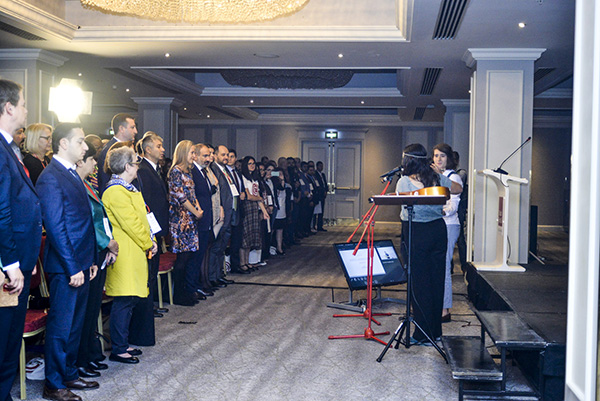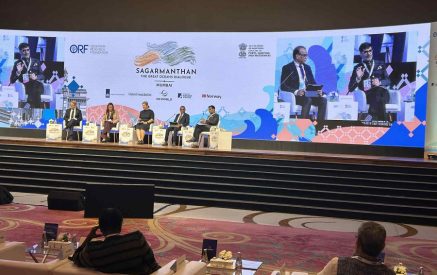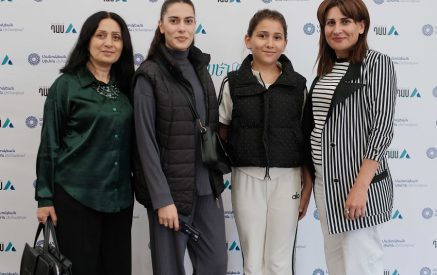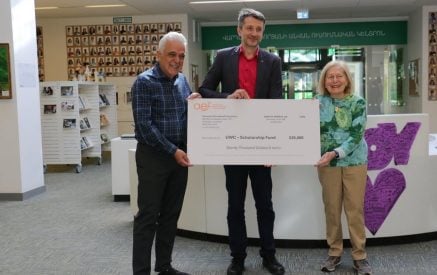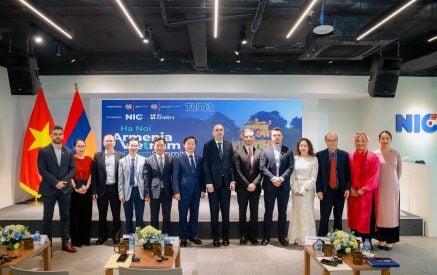Prime Minister Nikol Pashinyan today participated in the Education for All International Network’s annual conference. The conference was co-hosted by the Teach Armenia Foundation and the Education for All International Network. The event is attended by over 450 network members, including the network staff, students, assistants and guests from 75 countries.
Welcoming the delegates, the Premier said it was nice to host delegates from around the world, and wished the conference successful proceedings.
The Prime Minister’s participation in the Education for All conference was held in the format of an interactive discussion: Nikol Pashinyan discussed issues related to education with Edik Nazaryan, an 11-grade student from the city of Stepanavan, Lori Marz.
During the interview, the Prime Minister spoke about his hometown Idjevan, recalled his schooling days and emphasized the importance of treating education as an ongoing process.
Read also
“Many people understand education as a period that begins, say, with the first class or preschool and ends somewhere at the university or at some other point.
For me, education is an ongoing process, and that is why now, when we are discussing the strategic vision in our country, we have a point there that we hope to implement in our country. It is formulated as follows: to make education a national lifestyle in the Republic of Armenia.
What do we mean by saying that education should continue throughout a person’s life? I also proposed this slogan: the educational and intellectual level of each of us every day should be at least a little higher than on the previous day.
By the way, by education I don’t mean that you need to acquire only academic knowledge, because everything is education – the style of speech, communication style need educational development, and this applies to everyone – from the craftsman to the artist and government official,” the Head of Government said.
Evoking his school memories, Nikol Pashinyan noted: “In fact, I went to school on my own initiative, and not by administrative decision. I went to school at the age of 5 and not from the beginning of the school year. The fact is that my mother worked in school as a clerk, and in our house there was an alphabet that I began to study, and at some point I demanded that my mother take me to school.
In the end, she took me to school and asked her friend, a primary school teacher, to leave me in this class for several days, so that, as they say, I would leave them alone at home. These few days, in fact, were the beginning of my school life.
I think this was crucial because I probably realized subconsciously (and now I come to this conclusion) that self-education is the most important component of education, because, imagine, at school, yes, they give us programs, teachers conduct the educational process, but if it turns out that a person does not want to learn something, figuratively speaking, he cannot be taught by force.
Consequently, the biggest role of education and the educational system is to encourage a person, child, pupil, student to self-education, because the most successful students in both school and university are those who perceive this process not as an administrative decision, according to which others force them to study, and they themselves try to satisfy their thirst for knowledge and education. Therefore, the most important component of education, in my opinion, is self-education, and since then I have been treating education that way.”
In his speech, Prime Minister Pashinyan touched on the role of education in the history of Armenia and Armenian statehood, the importance of creating the Armenian alphabet and the importance of the Armenian language as an educational tool.
When asked about his dream education, Prime Minister Nikol Pashinyan answered: “For me, dream education is when there are no obstacles and no opposition between the student and teacher, between the student and the school. Dream education broadens the worldview of the child and supports his desire to learn more, because sometimes it happens that attempts are often made to set boundaries for knowledge: you need to know so much, and knowing more is already contrary to some supposed interests, values and so on. This is done mainly in authoritarian systems, where a certain framework for knowledge is established.
Since we are on the road to major democratic reforms, the most important task is to ensure that there are no barriers to education, no matter what knowledge and direction. In many countries (I think, in our country, this phenomenon also existed and is still trying to exist by inertia) there is a certain border to which history needs to be known. These boundaries must be removed, because the most important mission of cognition and knowledge is to face the truth in order to make it possible for a person to know the truth. This is the education that I dream of when the limits of human knowledge are not limited, especially in the 21st century, when now, in fact, discussions about Mars are already assimilated and the human mind is already moving on. Armenia should take its rightful place in this process, especially since we stated that we perceive Armenia as a free, democratic and technological country, and although it sounds a little harsh, education is the most powerful technology that has always been the basis civilization and progress.”
Answering a question about the civic activism of students and young people in general, the head of government said: “The most active participants in the revolution in our country last year were schoolchildren, students criticized us a lot for this, but I think everyone knows that we haven’t taken any steps for involving children and schoolchildren in political processes.
There were 1-2 cases, but these were not schools, but universities or professional educational institutions, when we saw that the leaders of these educational institutions closed the doors so that students did not go out. In these cases, we helped open the door. But I was always wondering why the students were so active in the revolutionary processes.
In my opinion, this was a protest against educational relations in Armenia, and conclusions must be drawn from this. Perhaps this was due to the fact that boundaries were set for children’s knowledge, conditions were put forward, and there was a certain opposition between the school and the student.
I believe that this opportunity should be used to avoid confrontation, and the school has become a place where children tend to go, spend more time, receive more, where children satisfy their thirst for knowledge and at the same time their thirst increases.
I do not mean that students must make decisions themselves, but they need to be heard, and their voices must be heard in the sense that we need to understand what they want, especially now, in the 21st century, when they sometimes surpass adults, teachers, at least in the field of technology, technological capabilities, because ultimately the education is not intended for the government, nor for the minister, nor for the director.
Education is for students, and we must keep them in the limelight to help them lead their lives to success, prosperity, security and happiness.”
***
The “Teach For All” international conference held in Yerevan from October 21 to 23 was organized this year by the Teach for Armenia Educational Foundation, which conducts educational events aimed at identifying the potential of more than 14,000 children in 7 regions of Armenia.
The theme of the conference in Yerevan is: how to prepare students for creativity in an ever-changing world. Discussions will be held by representatives of the international network “Teach For All,” as well as external experts and various groups.
“Teach for Armenia” NGO was founded in 2013. Its goal is to improve the public education system in Armenia so that it is equally accessible to all children of Armenia.
“Teach For All” is a global network of 50 independent and independent enterprises interested in improving the quality of education in their countries. The purpose of the network is to disseminate education, stimulate partnerships, ensure the availability of global resources and develop leadership skills.
INFORMATION AND PUBLIC RELATIONS DEPARTMENT OF THE OFFICE OF THE PRIME-MINISTER OF THE REPUBLIC OF ARMENIA




















































